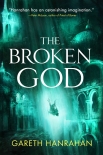The Broken God by Gareth Hanrahan (most life changing books .txt) 📗

- Author: Gareth Hanrahan
Book online «The Broken God by Gareth Hanrahan (most life changing books .txt) 📗». Author Gareth Hanrahan
Cari, he calls, can you hear me?
Nothing. He didn’t think she would be able to hear him. She’s half the world away, and Spar’s reach is limited to the New City.
Rasce, though, isn’t even fully aware of Spar. It’s more like the two have become entangled, like Rasce blundered through a dark alleyway and emerged with Spar’s mind clinging to him like a cobweb on his sleeve.
He feels as fragile as a cobweb. Spar strained himself with miracles during the invasion, spent his power profligately. He’s not a god – all he had was the stolen divine potency of the Black Iron Gods, and he’s used up all he could carry. For now, he can only observe through a hundred thousand windows, a hundred thousand eyes.
Spar watches Baston visit the house on Lanthorn Street. Rasce now keeps a little snuffbox of ash taken from the ruins of Dredger’s yard on his desk. Spar wonders how much of Tiske is mixed into that black dust.
Baston doesn’t take the ash, but some of the other thieves from the Wash do.
Spar finds that he’s able to watch Baston without falling into the traps of memory – Rasce keeps him anchored in the present.
Rasce, can you hear me? he calls. Rasce shivers, like Spar’s thought is a breath on the back of his neck, but he still cannot hear.
Cari couldn’t hear Spar either, at first. It took time to build that connection. He can afford patience, even as Rasce paces the halls of the house on Lanthorn Street (his footsteps echoing through Spar like a new heartbeat), eager to press on with his campaign. Spar can share Rasce’s excitement – and his fears. Anticipation of the dragon’s return is a constant presence in the back of Rasce’s mind, the shadow of great wings. Fragments of emotion bleed through.
Why Rasce? Spar can only guess. He’s not a god, but the terminology of sainthood is all he has to use. From what he knows, gods don’t exactly choose their saints – it’s a question of potential, like lightning striking the tallest point in the landscape. It can be the work of a moment, too. Cari’s Aunt Silva was a Safidist, an adherent of the branch of the Keeper’s church who sought sainthood. She diligently performed the rites, offered sacrifices, mortified her flesh, but the gods ignored her for years until that lighting flash finally came. And then, once the connection was established, it endured even after Silva’s mind was broken. Compare that to Saint Aleena, who had no time for rituals or worship, who was endlessly profane in every sense of the word – but for one moment she’d attracted the attention of the gods, and that was enough to bond her to the gods for the rest of her life.
So, why Rasce? Spar and the Ghierdana are both of similar age – well, Spar’s been dead for two years, but set that aside for now. They’re both heirs to criminal dynasties. Spar’s father Idge was master of the Brotherhood; Rasce’s Chosen of the Dragon. Was that enough for a moment of congruency?
If Spar could choose, he would not pick Rasce. The Ghierdana boy may have had a similar upbringing, but they’re very different men. Rasce has no love for the people of Guerdon, no thought of a higher calling. He’d pick another connection instead. Baston, maybe. They were friends, before Spar’s illness, before Baston became the Fever Knight’s lieutenant. There were others Spar would have chosen before Baston, but most of them are dead. Can he give Baston that saint’s grace, instead?
He reaches out with his soul. Exerts his will as best he can.
Baston, can you hear me?
Nothing. He pushes harder, slips – and now it’s a day later. Maybe two. Mid-morning, and Rasce’s walking out of the New City, passing the checkpoints along the border. Spar’s disorientated, his consciousness as slippery as wet soap. He clings to Rasce with what strength he can muster, desperate to avoid those chasms of oblivion.
He can’t let himself fall again.
Rasce shivers as icy raindrops trickle past his collar and run down his back. Another advantage of soaring above the clouds denied to him. No wonder everyone in Guerdon seems to wear hooded cloaks or drab, heavy coats. Streams gush from the drainpipes, making the pavement a series of rivers that must be forded. This afternoon’s downpour has emptied the streets of Glimmerside. Only a few hardy souls can be seen on the street, and half of them are his Brotherhood recruits. Baston strides along just ahead of Rasce and Vyr, and Rasce can almost imagine him growling faintly. Karla’s already gone ahead, to keep watch on Craddock’s.
Vyr sniffles into a handkerchief. “I need to stop along here for a moment,” he says. “An errand for my father.”
“As you wish.” They’re in the free city, but he and Vyr are the only Ghierdana members of this little expedition, and he’s not expecting trouble. Burning Dredger’s yard was the artillery barrage; today, they’re bonepicker priests, collecting the souls of the fallen.
The streets here are lined with bookshops, stationers, cafés. Tailors with academic robes and tasselled hats in their windows, makers of alchemical paraphernalia, dealers in reagents and relics. Rasce notes the shimmer of yliaster amid jars of other alchemical substances – dilute phlogiston, aetherated salt, tincture of divinity, mother’s milk, sweetened vitriol. Vials and syringes of alkahest, the drug that the Stone Men use to slow the progress of their horrible disease.
Vyr enters a curious little establishment. At first, Rasce mistakes it for a jewellers’, but when he wipes away the rain that beads the heavy slate-glass window, he discovers





Comments (0)